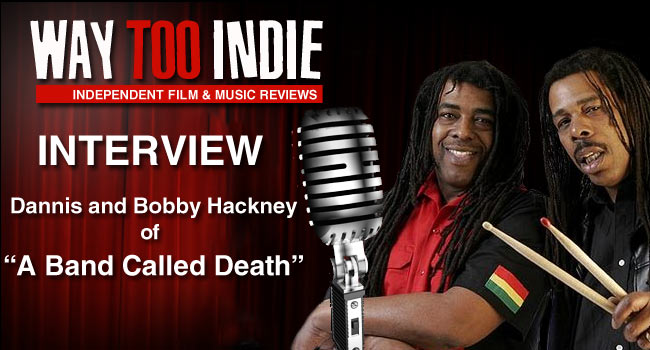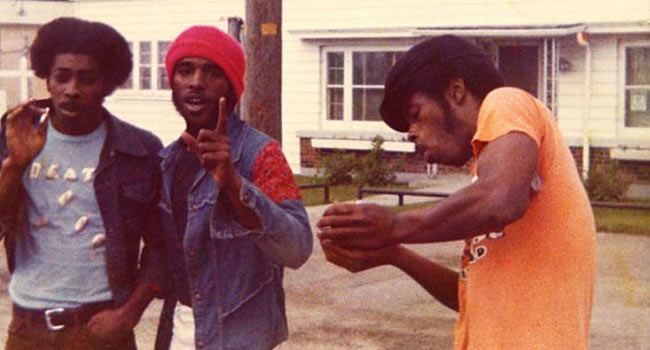Interview: Dannis and Bobby Hackney of A Band Called Death

Before Rancid, before the Sex Pistols, before the Ramones, there was Death. A band called Death, to be more specific. In the ‘70s, a few years before the Ramones changed music, three brothers—David, Dannis, and Bobby Hackney—formed Death, and recorded the world’s very first punk record, before the world knew punk existed.
The band never hit it big, and their recordings were kept locked away in an attic for decades. In 2000, David, the musical and spiritual leader of the band, died. Prior to leaving the earth, he told his brothers that the world would come looking for their music one day. In 2008, his prediction came true—one of the band’s songs, Politicians in My Eyes, began taking the blogosphere by storm, culminating in Bobby and Dannis reforming the band and reigniting the dream.
Co-directors Mark Christopher Covino and Jeff Howlett’s A Band Called Death plots out the unlikely legacy of the band and delves into David’s fascination with death and how his unique spirituality pervaded the band’s music.
Dannis and Bobby took some time to chat with us about growing up in ‘70’s Detroit, the how they reacted to David’s view on life and death, the rebirth of Death, and more.
Talk a little bit about what Detroit was like when the three of you were kids.
Dannis Hackney: Well, of course you had Motown, and the things that they were doing. You also had Detroit Rock City. Half the city was Motown, the other half was Detroit Rock City. It was a lot of fun between the both of them, being the kind of musicians we were. We were soul-searching, so we were looking for the sound that we felt comfortable with. We had a lot [of music] to choose from.
In your neighborhood, it was more Motown, right?
Dannis Hackney: Oh yeah, it was more of the Motown.
How much flak did you guys get for playing loud rock music in your neighborhood?
Dannis Hackney: We got a lot of flak! They called the police [on us], they knocked on the doors, they walked around and insulted us. Our way of getting back at them was, “Ok, you want to insult us? We’ll turn it up to eleven-and-a-half!” (laughs) That was mostly our brother David. It contributed to the loudness and the speed of the music too. Any time you play when you’re angry, you’re going to play louder and faster.
Your music is now known as the precursor to punk rock, proto-punk. When you were jamming in that cramped room, did you guys realize you were creating a genre of music?
Dannis Hackney: No, man. We didn’t know we were creating anything. When we were growing up, if you called somebody a punk, you got a bloody nose. That’s as far as we went with the word “punk” until our children’s children were born. Then the word “punk” was acceptable.

You guys knew Jeff Howlett prior to filming, correct?
Dannis Hackney: My brother [Bobby] knew Jeff as far back as when Jeff himself was in a punk band. They met when we were playing reggae. Bobby knew that Jeff was a film student, and as time went on, they developed a relationship with each other. There were a lot of things Jeff didn’t know about Bob and a lot of things Bob didn’t know about Jeff. When they finally got together in the latter years, some of those things were found out, and by that time, Jeff wanted to put it on film. In the early days of the film, we started looking at the early takes and thought, “This may be something serious, man. We’d better put both feet into this.” When everybody put everything into [the project], it became the film that we have [now]. It’s a good thing.
The project started out as a rockumentary, but evolved into more of a family film. When you started noticing this happening during filming, were you comfortable with that?
Dannis Hackney: We were comfortable with that. It was our family who made it easy and accessible for us to enjoy music the way we did. To tell the story without our family would only be half the story. You know, David’s fascination with spiritual events and our father’s fascination with historical events all correlated into what we have today. That’s why we’re so sorry David’s not around to enjoy all the things he predicted would happen.
Did you share David’s spirituality when you were young?
Dannis Hackney: When we were young, I didn’t take it that seriously. I didn’t take a lot of things that seriously (laughs). [It took time for me] to really pick Dave’s concept apart to see how it was fitting to me. When he did explain his whole concept of death, I had to go with it. It was everything I had faith in.
Bobby Hackney: 1968 was a really pivotal year for us, because music exploded in America. That was the greatest summer of music that I ever experienced in my life. Woodstock was happening, The Jimi Hendrix Experience was exploding, Sly and the Family Stone came out with their first song. Music in 1968 was incredible. Also that year, Martin Luther King Jr. was assassinated in April, my dad died in May, and Bobby Kennedy was assassinated in August. It was a roller coaster ride of emotions—fear, anxiety, and not really knowing what the future would hold. For us, it was the year we had to grow up very quickly. When my Dad died, that was when David really dove into spirituality.
“Backing up your brother” is really important to you guys.
Dannis Hackney: That’s something my dad taught me. He used to watch a lot of westerns, and some of the ideology from the westerns would filter into him, and he’d filter it into us. If my brothers did something, I was always there to back them up! We’d go to amusement parks: “Stay with your brother. Stay with your brother.” Back him up. We always grew up with that concept.
Talk a bit about the new music you’re working on.
Bobby Hackney: I’m excited that the music that we thought would never be heard again…(trails off). Me and David didn’t perform much because people didn’t want to hear us play live. The only thing we could do was practice a lot and write a lot of songs. David wrote a lot of songs, songs I never thought would see the light of day. I’m happy to say that we just completed a new album, and six of those songs are from the Death songwriting archives from the ‘70s. Everybody that’s heard it so far has absolutely loved it. Our kids, Rough Francis, they’re our panel to let us know what we’re doing wrong or right. We let them hear the project, and they just went absolutely wild over it. We’re looking forward to bringing it out to the public.
A Band Called Death plays from July 5-11 at the Roxie in San Francisco and is available on VOD now.
Watch the trailer for A Band Called Death:
